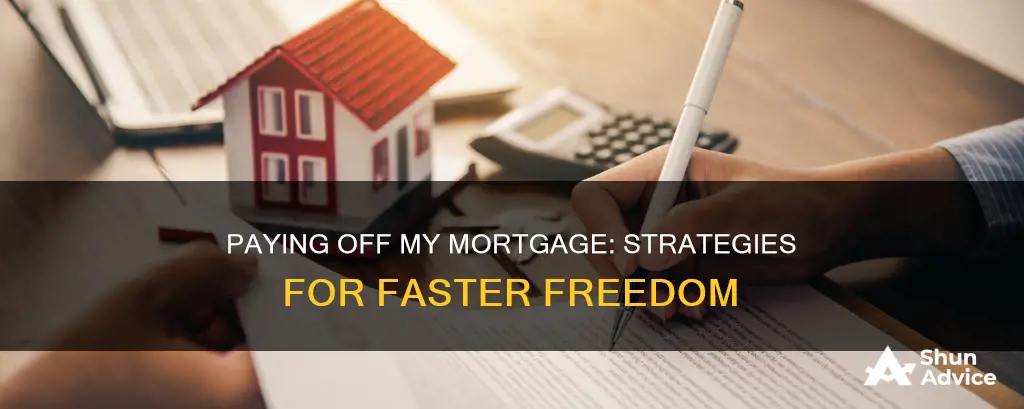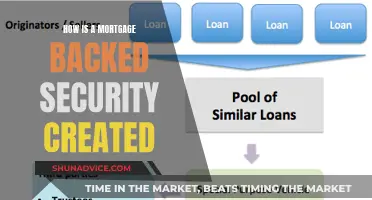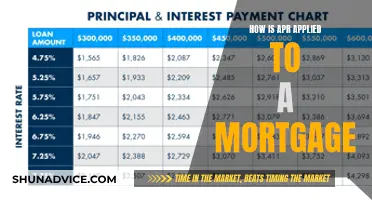
Paying off a mortgage early can be a great way to build wealth and achieve financial freedom. While it may be a challenging decision, the benefits of getting rid of that debt include saving money in the long run by avoiding additional interest, having extra money each month to save for retirement, and achieving financial stability. There are several strategies to pay off a mortgage faster, including refinancing to a lower interest rate or shorter loan term, making extra or larger payments, and switching to biweekly payments. It's important to keep a balanced financial life by paying off high-interest debt, saving for retirement, and preparing for emergencies.
| Characteristics | Values |
|---|---|
| Extra payments | $100 a monthor $1,000 a month |
| Biweekly payments | 26 half payments over a year, amounting to 13 full payments |
| Rounding up | Paying $800 instead of $743or $900 instead of $860 |
| Dollar-a-month strategy | Payment increases by $1 every month |
| Refinancing | Lower interest rate or shorter loan term |
| Windfalls | Use windfalls to pay off mortgage |
| Bonuses | Use bonuses to pay off mortgage |
| Other | Financial stability, saving for retirement, paying off high-interest debt, building savings, preparing for emergencies |
What You'll Learn

Refinance to a lower interest rate
Refinancing your mortgage to a lower interest rate can be a great way to pay off your mortgage faster. When you refinance, you replace your current mortgage with a new one that has different terms. This can include a lower interest rate, which can help you save money on your monthly payments and over the life of the loan.
There are a few things to keep in mind when considering refinancing to a lower interest rate. First, you'll want to make sure that you're getting a significantly lower interest rate than your current mortgage. This can help ensure that the savings outweigh any closing costs or other fees associated with refinancing. It's important to do the math and weigh the long-term benefits against any short-term costs.
Additionally, you may be able to refinance to a shorter loan term, which can help you pay off your mortgage faster. For example, if you currently have a 30-year mortgage, you could refinance to a 15-year mortgage. This will likely increase your monthly payments, but you'll save on interest over the life of the loan.
Another thing to keep in mind is that refinancing may not always be the best option if you're already several years into your current mortgage. This is because refinancing will reset the clock on your loan, and you may end up paying more in interest in the long run. It's important to consider your break-even point, which is the amount of time it will take for the savings from a lower interest rate to outweigh the costs of refinancing.
Finally, when considering refinancing, it's important to shop around and compare offers from multiple lenders. This can help you get the best interest rate and terms for your new mortgage. It's also a good idea to work with a financial advisor or mortgage broker who can help you navigate the process and ensure that you're making the best decision for your financial situation.
HUD Mortgage Policy: Fueling the Housing Crisis
You may want to see also

Make extra payments
Making extra payments towards your principal balance on your mortgage loan can help you save money on interest and pay off your loan faster. If you want to make extra payments on your mortgage, budget extra money each month to put towards your principal balance.
One way to do this is to pay 1/12 extra each month. For example, by paying $975 each month on a $900 mortgage payment, you’ll have paid the equivalent of an extra payment by the end of the year. This is a budget-friendly way to pay off your mortgage faster.
Another strategy is to round up your mortgage payments to the next highest $100 amount. For example, pay $800 instead of $743, or $900 instead of $860. This is called the dollar-a-month strategy and is a feasible option if your income increases slightly but consistently over time.
You can also increase your monthly payment by a certain amount. For example, adding an extra $100 a month to your mortgage payment could help you pay off your loan faster and result in interest savings. This is equivalent to an extra payment of $1,200 per year, or $12,000 over 10 years.
It's important to note that some lenders may charge a prepayment penalty for paying off your mortgage early. This fee may be incurred for making certain types of payments, such as a lump-sum payment. Therefore, it's essential to check with your lender about any potential penalties before making extra payments.
Mortgage Borrowing: When Is It Too Much?
You may want to see also

Avoid fees and penalties
Paying off your mortgage early can be a great way to build wealth, but it's important to be aware of any fees and penalties that may apply. Here are some tips to help you avoid fees and penalties when paying off your mortgage faster:
Firstly, check for any prepayment penalties with your lender. Many mortgage loans do not have prepayment penalties, but it's always good to confirm. A prepayment penalty is a fee charged when a mortgage is paid down or paid off early. The specific terms of the penalty may vary, so understanding them can help you plan your payments effectively. For example, you may be able to increase your monthly payment by a certain amount without incurring a fee, but paying off a large lump sum may result in a penalty.
Secondly, be cautious when using retirement savings to pay off your mortgage early. Withdrawing money from a 401(k) or similar retirement fund before the age of 59 1/2 typically results in a 10% early withdrawal penalty, in addition to taxes. This can significantly reduce the amount of money available to put towards your mortgage. It's generally recommended to keep your retirement savings intact and ensure you have enough funds for the future.
Another way to avoid penalties is to be mindful of how you make extra payments. While making extra payments can help you pay off your mortgage faster, ensure that these payments are applied to the principal balance and not towards interest. Inform your lender about this allocation to avoid any misunderstandings. Some lenders may automatically apply extra payments towards future scheduled monthly payments, which won't accelerate your payoff timeline.
Additionally, consider the potential fees associated with refinancing. Refinancing to a lower interest rate or shorter loan term can help you pay off your mortgage faster. However, refinancing typically comes with closing costs, which can range from 2% to 6% of the total loan amount. Therefore, it's important to weigh the long-term benefits against the immediate fees.
Finally, while not a penalty, it's worth noting that paying off your mortgage early may have a minor impact on your credit score. Once your mortgage is fully paid off, it will show up on your credit report as a closed account in good standing. However, keeping credit card balances low and paying all your bills on time generally have a more significant impact on your credit score.
Mortgages: Understanding the High Cost of $1800 Monthly Payments
You may want to see also

Budgeting and saving strategies
Budgeting Strategies
- Bi-weekly payments: Instead of making one monthly payment, switch to bi-weekly payments. This means paying half of your monthly mortgage payment every two weeks. Over the course of a year, you'll make 26 half payments, which is equivalent to 13 full payments, giving you an extra month's payment towards your mortgage.
- Rounding up: When budgeting for your mortgage payment, round up to the next highest $100 amount. For example, pay $800 instead of $743, or $900 instead of $860. This strategy can be especially effective if your income increases slightly but consistently over time.
- Dollar-a-month strategy: Start by paying an extra $1 in the first month, then increase your payment by $1 each month. For example, pay $900 the first month, $901 the second month, and so on. This gradual increase can help you reduce the term of your mortgage significantly.
- Refinancing: If mortgage rates have dropped since you initially took out your loan, consider refinancing to a lower interest rate. This can help you pay less interest over time. However, keep in mind that refinancing comes with closing costs, so make sure the overall savings outweigh these fees.
- Avoid new debt: While paying off your mortgage early is a great financial goal, it's important to avoid taking on new debt in the process. Focus on maintaining a balanced financial life by paying off any existing high-interest debt and saving for retirement and other important goals.
Saving Strategies
- Bonuses and windfalls: Dedicate any unexpected windfalls, bonuses, overtime pay, or cash gifts towards your mortgage. You can also consider putting aside a portion of these extra funds into a separate savings account specifically for your mortgage.
- Aggressive payments: If you're in a position to make aggressive payments, you can significantly reduce the term of your mortgage. However, this may require sacrificing other financial goals, so carefully consider your priorities and seek expert financial advice if needed.
- Avoid using retirement savings: While it may be tempting to dip into your retirement savings to pay off your mortgage faster, this is generally not recommended. Withdrawing from a 401(k) early can result in tax implications and penalties, leaving you with less money for retirement.
- Build an emergency fund: While paying off your mortgage early is a worthy goal, it's important to have financial security in case of unexpected events. Build an emergency fund that can cover at least three to six months' worth of living expenses to protect yourself from potential financial hardships.
Paying Off My Mortgage: Strategies for Early Freedom
You may want to see also

Using windfalls
Before using windfalls to pay off your mortgage, it is important to consider other financial goals and priorities. These may include paying off high-interest debt, such as credit cards, car loans, or student loans, building an emergency fund, investing for retirement, and saving for your children's education. It is generally not advisable to withdraw money from your retirement savings to pay off your mortgage early, as this could result in tax implications and early withdrawal penalties.
Another factor to consider is the interest rate on your mortgage. If you have a high-interest rate, it is generally more prudent to use your windfall to pay off your mortgage, as the interest cost can add up significantly over time. On the other hand, if you have a low-interest rate and a good history of staying within a budget, investing your windfall may be a better option.
It is also worth noting that paying off your mortgage early can provide financial stability and save you money in the long term by reducing the total interest paid. However, refinancing your mortgage to take advantage of lower interest rates or a shorter loan term can also help you pay off your mortgage faster.
Understanding Mortgage Payments: How High is Too High?
You may want to see also
Frequently asked questions
There are several ways to pay off your mortgage faster. You can make extra payments toward your principal balance, reducing the amount of money you borrow and helping you qualify for a lower interest rate. You can also refinance to a lower interest rate or shorter loan term, though it’s important to weigh the fees and long-term benefits.
By paying off your mortgage faster, you can save thousands of dollars in interest. For example, by adding $300 to your monthly payment of $993 on a $200,000 home, you can save over $64,000 in interest and pay off your home over 11 years sooner.
Paying off your mortgage early can provide you with financial stability and the freedom of being completely debt-free. It can also give you more flexibility in your career choices and help you endure turbulent housing market conditions.
Yes, it's important to maintain a balance in your financial life. Before focusing solely on paying off your mortgage, you should also prioritize paying off high-interest debt, saving for retirement, and building an emergency fund. Additionally, refinancing to a shorter-term may come with closing costs, so it's important to consider the overall savings versus the fees.
You can budget extra money each month to put toward your principal balance. You can also switch to biweekly payments, which would mean paying half the mortgage payment every two weeks, resulting in an extra month's payment per year. Dedicating overtime pay, bonuses, or cash gifts to your mortgage can also help you pay it off faster.







